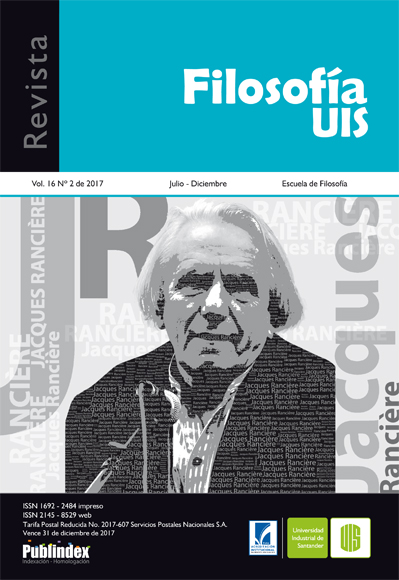Pedagogy of the concept according to Gilles Deleuze
Published 2017-12-14
Keywords
- Pedagogy of the concept,
- philosophy,
- plane of immanence,
- conceptual personae,
- ontology of the concept
How to Cite
Copyright (c) 2017 Revista Filosofía UIS

This work is licensed under a Creative Commons Attribution 4.0 International License.
Abstract
This article gives a detailed explanation of the first three chapters of Deleuze and Guattari’s book What is Philosophy? in order to argue that the rarely discussed idea of pedagogy of the concept is the main procedure of this work as a whole. Firstly, an analysis of chapter I of What is philosophy? explains the relation between the ontology of the concept and the pedagogy of the concept. The second section stablishes the role of the pedagogy of the concept as the function of unveiling the plane of immanence through a meticulous of chapter two. The third section locates the function of the conceptual personae within the relation of the concept and the plane of immanence as a third moment of the pedagogy of the concept. Throughout the article many problems about Deleuze’s idea of philosophy are detected about this book and are retaken in the conclusions.
Downloads
References
Alliez, E. (1998). De la imposibilidad de la fenomenología Sobre la filosofía francesa contemporánea. Santiago de Cali: Universidad del Valle.
Bell, J. A. (2016). Deleuze and Guattari’s What is Philosophy? Edinburgh: Edinburgh University Press.
Bianco, G. (2005). Ottimismo, pesimismo, creazione: Pedagogia del concetto e resistenza. Educação & Sociedade, 26(93), 1289-1308.
Bourdieu, P. (1995). Las reglas del arte: génesis y estructura del campo literario. (Kaud, T. Trad.). Barcelona: Anagrama.
Butler, R. (2016). Deleuze and Guatari’s «What is Philosophy?». London: Bloomsbury Publishing Plc.
Deleuze, G. (1994). Lógica del sentido. (Morey, M. Trad.). Barcelona: Paidós.
Deleuze, G. (1995a). Conversaciones. (Pardo Torío, J. L.Trad.). Valencia: Pre-Textos.
Deleuze, G. (1995b). Proust y los signos. (Monge, F. Trad.). Barcelona: Anagrama.
Deleuze, G. (1996). El bergsonismo. (Ferrero Carracedo, L. Trad.). Madrid: Cátedra.
Deleuze, G. (2002a). Diferencia y repetición. (Silvia Delpy, M. y Beccacece, H. Trad.). Buenos Aires: Amorrortu.
Deleuze, G. (2002b). Empirismo y subjetividad. (Acevedo, H. Trad.). Barcelona: Editorial Gedisa SA.
Deleuze, G., & Guattari, F. (1997). ¿Qué es la filosofía? (Kauf, T. Trad.). Barcelona: Editorial Anagrama.
Dosse, F. (2009). Gilles Deleuze y Félix Guattari: Biografía cruzada. México: Fondo de Cultura Económica.
Gasché, R. (2014). Geophilosophy: On Gilles Deleuze and Felix Guattari’s What Is Philosophy? Evanston: Northwestern University Press.
Goodchild, P. (1996). Deleuze and Guattari: An introduction to the politics of desire (theory, culture and society). Londres: University of Lancaster Press.
Guattari, F. & Deleuze, G. (1997). Mil Mesetas: Capitalismo y Esquizofrenia II. (Vázquez, J. y Larraceleta, U. Trads.). Valencia: Pre-Textos.
Heidegger, M. (1998). Ser y Tiempo (1927). (Ribera, J.E. Trad.). Santiago de Chile: Editorial universitaria.
Heidegger, M. (2005). ¿Qué significa pensar? (Gabas, R. Trad.). Madrid: Editorial Trotta.
Searle, J. (1999). Mind Language and society—philosophy in the real world. Nueva York: Basic Books.
Weitz, M. (1988). Theories of Concepts. Nueva York: Routledge.
Wundt, W. (1911). Introducción a la filosofía: La filosofía contemporánea en Alemania y la filosofía científica. (André, E.L. Trad.). Madrid: Daniel Jorro.
Zourabichvili, F. (2004). Deleuze una filosofía del acontecimiento. (Agoff, I. Trad.). Buenos Aires: Amorrortu.
